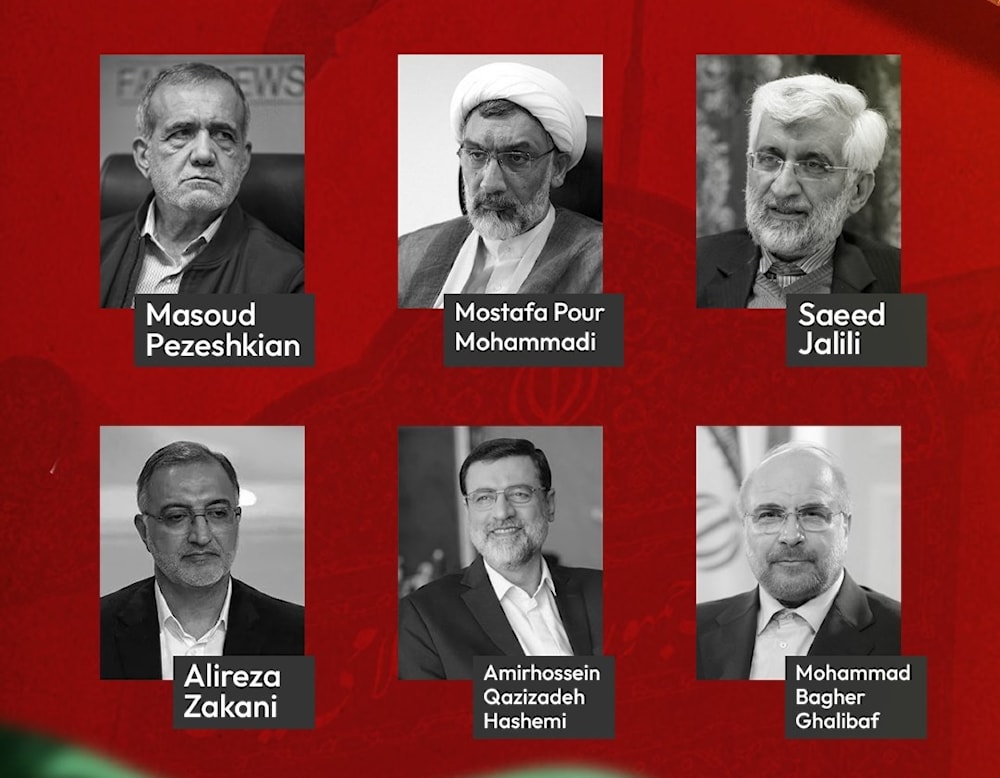Iran presidential candidates discuss foreign policy in 4th live debate
Iran's presidential candidates engage in their fourth live debate, in which they put forward their election programs and offer solutions to Iran-related issues.
-

The six candidates for the 14th Iranian election set for June 28, 2024
The six candidates for the 14th Iran Presidential election are participating in their fourth live broadcast debate in which they put forward their election programs and offer solutions to Iran-related issues.
Pezeshkian
Pezeshkian emphasized his commitment to the policies set by the leader of the Islamic Revolution, Sayyed Ali Khamenei. He also praised the late Iranian President Ebrahim Raisi for pursuing the nuclear deal issue.
According to Pezeshkian, Iran must reach out to experts to address issues and resolve them, arguing that if Tehran doesn't address the current problems with such an approach, it will not be able to bypass sanctions-related issues easily.
Bagher Qalibaf
Addressing the issue of unjust sanctions against Tehran, Qalibaf highlighted the potential of BRICS and SCO to neutralize the sanctions.
"If our oil sales are freed, we can reinstate the Additional Protocol; if they free our ports, insurance, and central bank from sanctions, we can fulfill commitments," he said.
He also stressed the need to bridge the gap between "the disparity between people's income and inflation."
The upcoming Iranian elections might seem like a normal event, however, they come under unique circumstances.
— Al Mayadeen English (@MayadeenEnglish) June 24, 2024
This is not the first time #Iran has endured such a shocking turn of events as it has time and time again managed to keep things running smoothly.
Here's a small peak… pic.twitter.com/jvVTRR1hpF
Zakani
Zakani noted that the world is changing, and Iran cannot achieve a proper power position in the region and the world with outdated models and approaches.
He emphasized the importance of Iran's retaliation against "Israel" in Operation True Promise and Hamas' launch of Operation Al-Aqsa Flood, saying, "What happened in 'Operation True Promise' and 'Operation Al-Aqsa Flood' has changed the equations of the region."
Regarding the sanctions removal talks, he stressed, "No one has stopped JCPOA. In fact, we are pursuing the implementation of JCPOA. We have fulfilled our part, but they have not. They have betrayed and set it on fire."
Jalili
Jalili pointed out the significant opportunities in foreign policy, saying, "The problem is that you only interact with two or three countries that not only provide you with opportunities but also pose threats. We need to consider the whole world."
He emphasized that "from Latin America to Africa, our neighbors, and countries in the Resistance Axis can create opportunities for us; we should not overlook them."
Moreover, Jalili stressed that Iran faces two primary issues: employment and generating foreign currency. These concerns should be integral to our foreign policy, he maintained. He then emphasized that every embassy should function as an export platform with a defined mission to promote employment and boost foreign currency earnings for the country.
Pour Mohammadi
Pour Mohammadi highlighted the impact of strengthening domestic policy on foreign policy, stating that "foreign policy is an extension of domestic policy."
"If we are strong domestically, we can achieve and solidify our goals internationally," Pour Mohammadi said, stressing that "one of the important aspects of diplomacy is economic diplomacy. Regional agreements have progressed well, thanks to the late President Raeisi's government."
Ghazizadeh Hashemi
On his part, Ghazizadeh Hashemi emphasized that "Iran's policy has always been to establish peace and prevent foreign interference."
He also praised the roles of the late Iranian President Ebrahim Raisi and Foreign Minister Hossein Amir-Abdollahian in improving Iran's foreign policy situation. Ghazizadeh Hashemi further emphasized that Iran's relations with Saudi Arabia were restored, with Mohammad bin Salman seeking to strengthen personal ties with Raisi.
He noted that the issue with Egypt was also resolved, contracts with India, Russia, and China reached operational stages, and Iran joined both BRICS and the Shanghai Cooperation Organization.
Read more: Iran entered new phase of relations with Bahrain: Bagheri Kani

 4 Min Read
4 Min Read








